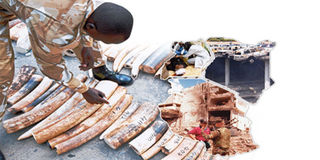How poaching funds terror

“Transnational criminal organisations are making immense profits by exploiting our natural resources to fuel their illicit activities, threatening the stability and future development of some of the world’s poorest regions,”.PHOTO|FILE
What you need to know:
These methods effectively bypass many customs efforts to restrict the import of illegal tropical wood to the United States and to the European Union.
Dar es Salaam/Nairobi. Terrorist and militant groups operating in East Africa make tens of millions of dollars annually out of poaching and illegal trade in forest products, according to a new report.
One group is estimated to make between $38 million and $56 million per year from the illegal trade in charcoal alone, says the report by the United Nations Environment Programme (Unep) and Interpol.
Although the report did not mention the terrorist group, the latest events in the region point to the Islamist Al Shabaab insurgents based in Somalia who have killed hundreds of Kenyans in recent attacks.
The report titled The Environmental Crime Crisis, A Rapid Response Assessment, was released Tuesday at the first United Nations Environment Assembly (Unea) in Nairobi.
Action against environmental crime, which includes the illegal trade in wildlife and timber products, is high on the agenda of hundreds of environment ministers, law enforcement officers, the judiciary and senior UN officials at the meeting.
In total, the report says, militia and terrorist groups in and around African nations with ongoing conflicts may earn $111 to $289 million annually from their involvement in and taxing of the illegal or unregulated charcoal trade.
Global environmental crime, worth up to $213 billion each year, is reportedly helping finance criminals, militia and terrorist groups and threatening the security and sustainable development of many nations.
“Beyond immediate environmental impacts, the illegal trade in natural resources is depriving developing economies of billions of dollars in lost revenues just to fill the pockets of criminals,” said UN Under-Secretary-General and UNEP Executive Director Achim Steiner.
Sustainable development, livelihoods, good governance and the rule of law are all being threatened, he said, as significant sums of money flow to militias and terrorist groups. He added: “This assessment reveals that, while there is growing awareness, the responses to date in terms of impact have not been commensurate with the scale and growth of the threat to wildlife and the environment.”
The scale of wildlife and forest crime calls for much wider interventions and policy action, Mr Steiner said.
According to the report, other groups that benefit from the illegal trade in wildlife and timber products are estimated to earn between $4 million and $12.2 million each year from elephant ivory in Central Africa, driving a significant reduction in elephant populations across Africa. The report points to greater awareness of--and response to--the growing global threat and calls for further concerted action and makes recommendations aimed at strengthening action against the organised criminal networks profiting from the trade.
Illegal logging and forest crime have an estimated worth of $30 to $100 billion annually, or 10 per cent to 30 per cent of the total global timber trade. An estimated 50 per cent to 90 per cent of the wood in some tropical countries is suspected to come from illegal sources or to have been logged illegally.
For pulp and paper production, networks of shell companies and plantations are used to funnel illegal timber through plantations or to ship wood and pulp via legal plantations. These methods effectively bypass many customs efforts to restrict the import of illegal tropical wood to the United States and to the European Union.
“Transnational criminal organisations are making immense profits by exploiting our natural resources to fuel their illicit activities, threatening the stability and future development of some of the world’s poorest regions,” said Interpol’s Executive Director of Police Services, Jean-Michel Louboutin. “While there is growing awareness of the dangers posed by wildlife crime, it will require a dedicated and concerted international effort among law enforcement and partner organisations to effectively combat this threat to global security.”
In Africa, 90 per cent of wood consumed is used for wood fuel and charcoal, with an official charcoal production of 30.6 million tonnes in 2012, worth approximately $9.2 billion to $24.5 billion annually. The unregulated charcoal trade alone involves an annual revenue loss of at least $1.9 billion to African countries.
For East, Central and West Africa, the net profits from dealing in and taxing unregulated, illicit or illegal charcoal combined is estimated at $2.4 billion to $9 billion, compared to the $2.65 billion street-value worth of illegal drugs in the region.
With current trends in urbanisation and the projected growth of over one billion additional people in Sub-Saharan Africa by 2050, the demand for charcoal is expected to triple in the coming three decades. This will set off severe impacts such as large-scale deforestation, pollution and subsequent health problems in slum areas.




